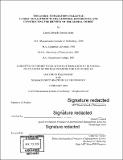The global integration challenge : global management teams, temporal differences, and constructing the identity of the global 'other'
Author(s)
Grassin-Drake, Laurel Edwards.
Download1108636889-MIT.pdf (11.53Mb)
Other Contributors
Sloan School of Management.
Advisor
Donald Lessard.
Terms of use
Metadata
Show full item recordAbstract
In this thesis, I investigate the challenges of 21st century global integration by examining it indepth at a Fortune 200 global supplier (CC) that faces strong pressures of both global integration and local responsiveness. While global integration is typically discussed at a macro level, here I use qualitative methods to study senior managers at a micro level. In this way, I establish critical internal struggles with integration, and reveal external dynamics of integration in a close inter-firm relationship as a strategic supplier. Results highlight the role of Global Management Teams as an essential linking tool. At the same time, I find that conflicting temporalities across locations, accompanied by a globally-shared logic of appropriateness, place restraints on this mechanism of integration: limiting the hours available, and consistently advantaging and disadvantaging specific geographies. I also draw on a unique data set to examine global integration in the context of a close, dependent relationship, with multiple boundary-crossing links. This consists of thirteen months of observations of the weekly virtual meeting of the global account team responsible for CC's largest customer (Alpha). Tracing the collective process by which the team constructs the organizational identity (01) of the "other" from their individual distributed interactions, I find that in constructing Alpha's global 01 the team is also co-creating their own global 01. Further, the process by which the team constructs Alpha's 01 to answer the question "who are they?" parallels well-documented internal processes used by organizational members to answer "who are we?" Importantly, through this co-creation, identity acts both as an alignment mechanism within CC, and across firm boundaries in the relationship. Finally, CC's identity work on Alpha extends beyond construction to shaping and enforcing Alpha's 01 as partner through active voice, engaging the customer's hierarchy from outside to discipline and shape the customer's behavior from within.
Description
Thesis: Ph. D., Massachusetts Institute of Technology, Sloan School of Management, February, 2019 Cataloged from PDF version of thesis. Includes bibliographical references (pages 141-158).
Date issued
2019Department
Sloan School of ManagementPublisher
Massachusetts Institute of Technology
Keywords
Sloan School of Management.